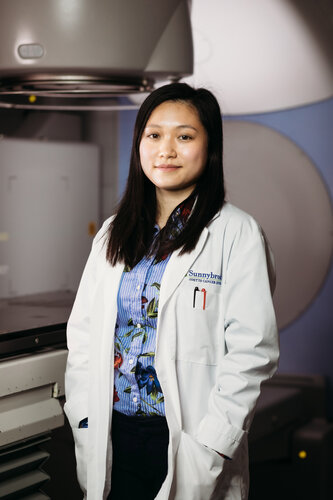
Yannie Lai has always been passionate about health sciences. Armed with a degree in Life Sciences from the University of Toronto, in 2016 she decided to supplement her education with an advanced diploma in Radiation Therapy at The Michener Institute of Education at UHN. Through the program, she was able to land a clinical placement at Sunnybrook Hospital where she now works as a Radiation Therapist.
In 2021, out of an interest in artificial intelligence (AI) she first developed while working in a start-up, she joined Michener’s Artificial Intelligence in Health Care Certificate Program. A year later she applied to the new AI for Clinician Champions Certificate Program, also a Continuing Education offering at Michener.
“I decided to pick this particular program because knowing that the amount of medical imaging data is so abundant, and coming from a background with experience in a start-up and some experience working as a Radiation Therapist, I had an inkling that AI could be used to accelerate patient care.”
Specifically, the AI for Clinician Champions program allowed Yannie to interact with clinicians and subject matter experts working directly in the field of AI within hospital environments, and to learn how AI applications will reshape healthcare.
“Where I work now, I see a number of pain points within the radiation therapy department that can be eased with AI, including the treatment planning process, the treatment delivery process, imaging matching process and patient scheduling. I feel that AI will become a very important aspect in my department but also in health care in general – so it would be nice to be in the forefront of that revolution.”
As a Radiation Therapist working in oncology, Yannie is acutely aware of the lengthy screening processes in place for patients faced with cancer diagnoses. Her capstone project in the Michener program involves using AI to manage these processes so they are less tedious for cancer patients and healthcare staff.
“I represent one of three or four options for people who come for cancer treatment. My idea was to use AI to assess breast cancer screening data so that we can predict what the caseloads will be like downstream. That way, departments such as chemotherapy or radiation therapy can be better prepared for the influx of patients with varying treatment plans.”
Although her project is still in the ideation phase, she credits the course with teaching her how to use Python and basic coding. It also gave her an opportunity to find open-source data on breast cancer screening, and create machine-learning algorithms such as linear regression and CNN (convolutional neural network) random forest. She remarks that working on the project was a great exercise in learning how to clean data and generate these algorithms.
Yannie is now looking into the possibility of expanding upon her early insights with the project she started at Michener.
“I was recently accepted into the Healthcare AI Innovation Hub, so hopefully I can seek some expert opinion on how to expand upon my idea.”